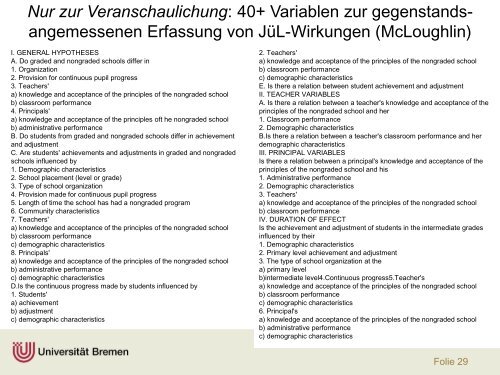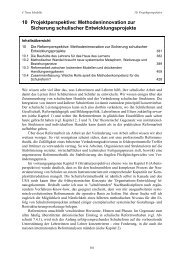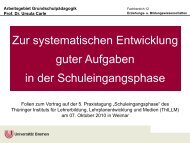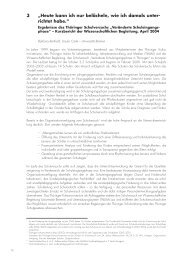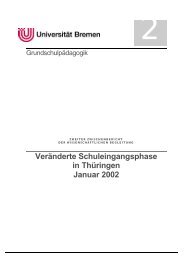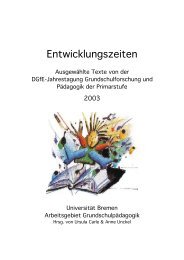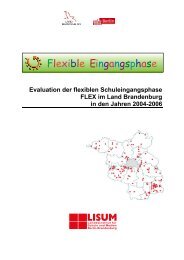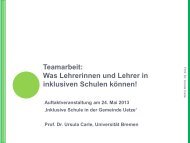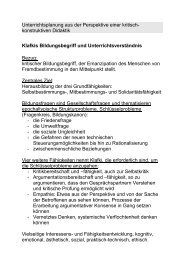Download - Arbeitsgebiet Grundschulpädagogik - Universität Bremen
Download - Arbeitsgebiet Grundschulpädagogik - Universität Bremen
Download - Arbeitsgebiet Grundschulpädagogik - Universität Bremen
Erfolgreiche ePaper selbst erstellen
Machen Sie aus Ihren PDF Publikationen ein blätterbares Flipbook mit unserer einzigartigen Google optimierten e-Paper Software.
Nur zur Veranschaulichung: 40+ Variablen zur gegenstandsangemessenen<br />
Erfassung von JüL-Wirkungen (McLoughlin)<br />
<strong>Arbeitsgebiet</strong> <strong>Grundschulpädagogik</strong><br />
Prof. Dr. Ursula Carle; Dr. Heinz Metzen<br />
Fachbereich 12<br />
Erziehungs- u. Bildungswissenschaften<br />
I. GENERAL HYPOTHESES<br />
A. Do graded and nongraded schools differ in<br />
1. Organization<br />
2. Provision for continuous pupil progress<br />
3. Teachers'<br />
a) knowledge and acceptance of the principles of the nongraded school<br />
b) classroom performance<br />
4. Principals'<br />
a) knowledge and acceptance of the principles oft he nongraded school<br />
b) administrative performance<br />
B. Do students from graded and nongraded schools differ in achievement<br />
and adjustment<br />
C. Are students' achievements and adjustments in graded and nongraded<br />
schools influenced by<br />
1. Demographic characteristics<br />
2. School placement (level or grade)<br />
3. Type of school organization<br />
4. Provision made for continuous pupil progress<br />
5. Length of time the school has had a nongraded program<br />
6. Community characteristics<br />
7. Teachers'<br />
a) knowledge and acceptance of the principles of the nongraded school<br />
b) classroom performance<br />
c) demographic characteristics<br />
8. Principals'<br />
a) knowledge and acceptance of the principles of the nongraded school<br />
b) administrative performance<br />
c) demographic characteristics<br />
D.Is the continuous progress made by students influenced by<br />
1. Students'<br />
a) achievement<br />
b) adjustment<br />
c) demographic characteristics<br />
2. Teachers'<br />
a) knowledge and acceptance of the principles of the nongraded school<br />
b) classroom performance<br />
c) demographic characteristics<br />
E. Is there a relation between student achievement and adjustment<br />
II. TEACHER VARIABLES<br />
A. Is there a relation between a teacher's knowledge and acceptance of the<br />
principles of the nongraded school and her<br />
1. Classroom performance<br />
2. Demographic characteristics<br />
B.Is there a relation between a teacher's classroom performance and her<br />
demographic characteristics<br />
III. PRINCIPAL VARIABLES<br />
Is there a relation between a principal's knowledge and acceptance of the<br />
principles of the nongraded school and his<br />
1. Administrative performance<br />
2. Demographic characteristics<br />
3. Teachers'<br />
a) knowledge and acceptance of the principles of the nongraded school<br />
b) classroom performance<br />
IV. DURATION OF EFFECT<br />
Is the achievement and adjustment of students in the intermediate grades<br />
influenced by their<br />
1. Demographic characteristics<br />
2. Primary level achievement and adjustment<br />
3. The type of school organization at the<br />
a) primary level<br />
b)intermediate level4.Continuous progress5.Teacher's<br />
a) knowledge and acceptance of the principles of the nongraded school<br />
b) classroom performance<br />
c) demographic characteristics<br />
6. Principal's<br />
a) knowledge and acceptance of the principles of the nongraded school<br />
b) administrative performance<br />
c) demographic characteristics<br />
Folie 29


